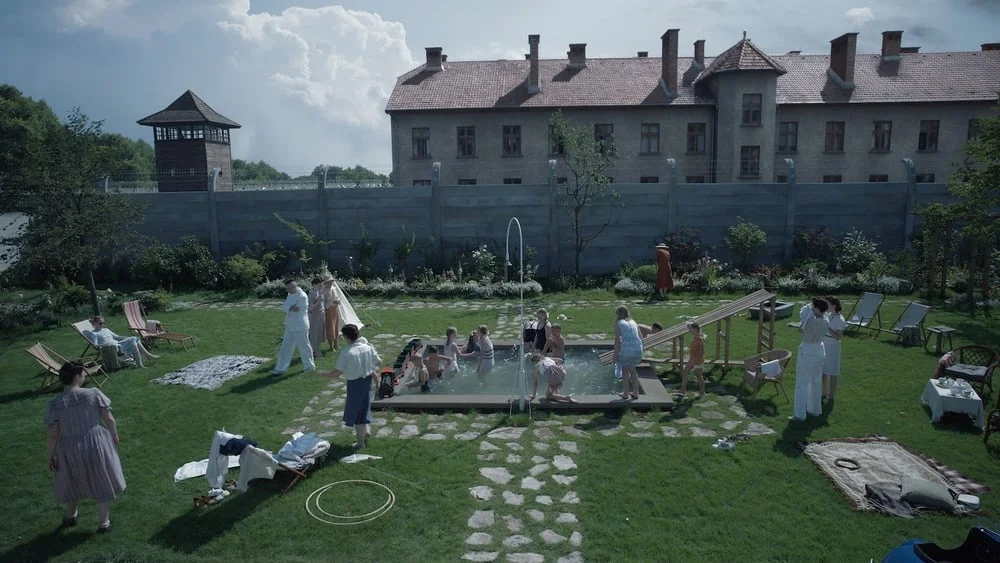At some point, I began shaking. I can’t remember which part because the film had me in such a stranglehold that I had lost all sense of time and space. It may have been the fade from beautiful flowers to a bright red screen, set to the far-off screams of the murdered innocents only to be cut off by the immediacy of Mica Levi’s harsh, droning score. Or perhaps it was Hedwig’s mother waking up in the middle of the night, her granddaughter screaming in another room, and being overwhelmed by the light from the fires of the crematorium outside her window. There is no hell, but there is Auschwitz.
Writer-director Jonathan Glazer has created a masterpiece with “The Zone of Interest,” a formally boundary-pushing and thematically bleak work that shows how oppression becomes normalized. Genocide isn’t carried out by the sadistic. It’s carried out by regular people. Strip the context away from the story (if you can even call it that) of “The Zone of Interest,” and you might be confused for thinking it's a run-of-the-mill domestic family drama. The patriarch is very good at his job but is torn between chasing success in his field and being with his family. His wife is left to take care of the children and doesn’t want him to abandon them to take a better opportunity that will force them to leave the home that they’ve built. They fight, and he leaves them behind to pursue his dreams. In doing so, he feels completely alone. He’s got everything he thought he wanted, but without his family, he is unfulfilled. But everything turns out okay because he’s given an even better job that allows him to come home to his wife and children. It’s the feel-good family movie event of the winter. You know, apart from the Nazi stuff.
Glazer wants to center the horror around normal, domestic issues. His film is observational, setting the camera up like a fly on the wall so that we never get too close to these characters by shooting in medium to wide shots. We are never meant to empathize with these monsters, but the approach forces us into their perspective. The family’s primary concerns aren’t with the millions they are in charge of (or complicit in) murdering. Instead, it’s with tending to their garden, making sure their children have the best of the best, and keeping the family together. Is the mass genocide happening right next door on their minds? Yes, that’s why we can always see the smoke of the trains or hear gunshots. But it’s treated as an everyday occurrence. It doesn’t bother them, and that produces the film’s terrifying, sickening dissonance.
At the film’s end, Glazer takes a moment to flash forward. Rudolf Höss leaves his office after telling his wife he’s finally coming home and that he’s excited about his new genocidal project. All Höss can think of now is the most efficient ways to kill the most people in a given space. As he’s walking down steps, he stops multiple times to nearly vomit. He looks down a dark hallway. Suddenly, we’re in the present. Janitors at the Auschwitz Museum clean and care for the exhibits. Does Höss see this and look at it with pride? That they are honoring his legacy by keeping the memory of his actions alive? Does he regret what he’s doing, recognizing the evil of his actions? Glazer has kept us distant from Höss because he wants us to ask these questions and be uncertain of their answers. We will never understand why these people did what they did and how they thought about their actions. It might be the film’s most haunting moment and an ever-necessary reminder that the Holocaust happened and that oppression is not something we’ve moved past. It’s not enough to recognize that genocide happened. We must remember the Holocaust to make sure it never happens again, to Jews and non-Jews alike. Oppression is still happening every day, and if you don’t think it is, you’re not looking and listening closely enough.
Viewing “The Zone of Interest” as a mere formal experiment, as many of its detractors have done, is a willful ignorance of how form impacts content. Even if that were all it was, the film is the most invigorating formal experience released wide in the United States in the past year. We should wish more films were this aesthetically daring. But the film is not just that, nor is it just about how Nazis are bad and how fascists don’t care about the people they harm. It’s about how anyone can get roped into genocide if it benefits them enough. Land, food, and even a dress can be enough for people to turn a blind eye to atrocities, no matter if they are filled with hatred for those affected or not.

